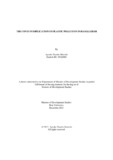The COVID 19 implication on plastic pollution in Bangladesh

View/Open
Date
2021-12Publisher
Brac UniversityAuthor
Mostafa, Ayesha TasnimMetadata
Show full item recordAbstract
Bangladesh has one of the world's highest population densities. The country was just named one of the world's most polluted emerging countries. Despite its poor air quality, the country's overall environmental situation is improving significantly. Bangladesh increased its ranking in environmental pollution control from 179th to 162nd out of 180 countries, according to the Environmental Performance Index (EPI 2020). However, the ongoing COVID19 (new coronavirus illness 2019) pandemic has resulted in a public health crisis and socioeconomic disaster in every country. As a result, plastic management programs must be strengthened, with a particular emphasis on preventing the entry of micro and nano plastics into the environment and food chain. It is much more critical to understand how much plastic garbage is generated and how different countries manage their plastic waste in the current epidemic condition. To combat the COVID-19 pandemic, individuals used a variety of non-pharmacological therapies, including medical masks, goggles or face shields, gowns, and other respiratory protection equipment. During the pandemic, this equipment has already generated increased volumes of hazardous waste, which will undoubtedly have an influence on the country's inadequate waste management and overall environmental performance. The research is conducted using primary and secondary sources, as well as contemporary evidence. Additionally, this review paper proposes additional analysis and extensive documenting of Bangladesh's biomedical waste problem, which is crucial for remedial action. How worldwide plastic production increased during COVID-19 and how this increased output would have both short- and long-term environmental implications have been discus in this paper. Moreover, plastic pollution will increase GHS emissions from incineration facilities during a pandemic. This review will assist individuals in comprehending the use of plastic and its ensuing environmental repercussions during a pandemic such as COVID-19.
